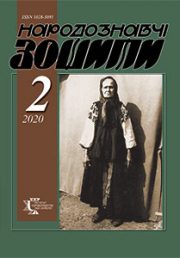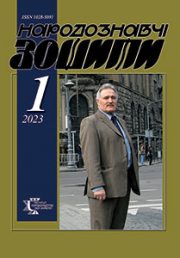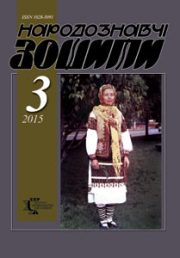The Ethnology Notebooks. 2019, № 4 (148), 1007—1016
УДК 39 : 303.5(477.85+498.6) “19/21”
DOI https://doi.org/10.15407/nz2019.04.1007
KOSTYK Vasyl
ORCID ID: https://orcid.org/0000-0003-3177-1919
Researcher ID: Е-22.69-2016
of philol. s., Associate
Professor of the Department of Ukrainian Literature
Fedkovych Chernivtsi National University, 2,
Kotsiubinskogo Avenue, 58012, Chernivtsi, Ukraine.
Contacts: e-mail: kostyk_vv@ukr.net
Abstract. Studying the history of Ukrainian folklore in Bukovyna, we have found that, for the period of almost two hundred years of formation and functioning of the folklore science, unfortunately, the regional Bukovynian folklore school was not formed/established there. However, it should be noted that an active work was carried out in these areas: plans for ethnographic and folkloristic studies of Bukovynian Hutsulshchyna, Bukovynian Pokuttia, Bukovynian Podillya, Bessarabia; topic programs-questionnaires on the recording of Ukrainian folk songs, legends, fairy tales, folk stories, proverbs and sayings, riddles, signs, beliefs (folk prayers), folklore and ethnographic complexes of the Ukrainian wedding ceremonies, and others were developed. This is due to the article topic relevance. The purpose of the study is to highlight the peculiarities of the formation of ethnographic centers in the region, the characteristic of the unitary practice of collectors and publishers of the Bukovynian folklore, the outline of issues range that was within the competence of folklorists.
Problem statement. The object of the study is collections, works, reviews of collectors and researchers of the folklore of the Northern (I. Velehorskyi, H. Kupchanko O. Lonchevskyi, Yu. Fedkovych, S. Vorobkevych, K. Lastivka, R. Volkov, L. Yashchenko, H. Sinchenko, O. Romanets, G. Bostan, A. Yakivchuk, H. Demyan, K. Smal, M. Ivaniuk, I. Bezruchko, M. Revutskyi, M. Ivasiuk, S. Dalavurak, M. Zinchuk, K. Popovych, Ye, Yaroshynska, P. Rusnak, O, Rosdolskyi), and in Southern Bukovyna — I. Abramyuk, I. Rebușapcг, M. Shandro, D. Onyshchuk, I. Kideshchuk, the program on the collection of folklore and ethnographic materials of the Ukrainian Museum of People Studies in Chernivtsi.
The subject of study is the consideration of aspects of the origin, formation and functioning of folklore (ethnographic) centers of Northern and Southern Bukovyna.
The work draws attention to the geographical and chronological coverage of the administrative territory of Bukovyna (Northern and Southern) for the period from the mid 19th — early 21st century. Mainly historical-cultural and structural-typological methods, as well as elements of geographic and other methods of folklore science are used in the article.. Based on handwritten, archive and printed sources and research literature, certain stages of the birth, formation and development of ethnographic centers of the region are analyzed and emphasized the role of organizers and leaders of the Ukrainian ethnology research. The result of the work of these organizations is ordering and publication of many folklore collections and writing of analytical articles, books on the functioning of Ukrainian folklore genres in the region.
Keywords: center, Bukovyna, collection, program questionnaire, school of folklore studies, collector, researcher, song.
Received 15.05.2019
REFERENCES
Kachkan, V. (1981). Osyp Makovei and Folk. Art Folk Songs in Records by Osyp Makovei (pp. 5—12). Kyiv: Muzychna Ukraina [in Ukrainian].
Bukovynian Folk Songs. (1866). Voice of People, 12—16. Rik I [in Ukrainian].
Fedkovych, Yu.H. (1869). A Songbook for Caring Children. Vienna [in Ukrainian].
Franko, I. (1902). Writings by Osyp Yurii Fedkovych. The first complete and critical edition (Vol. 1: Poetry). Lviv [in Ukrainian].
Makovei, O. (1911). Biography of Osyp-Yurii Hordynskyi-Fedkovych. Lviv [in Ukrainian].
Vorobkevych, I. (1870). Collection of Songs for People’s Lower and Real Schools. Chernivtsi [in Ukrainian].
Vorobkevych, I. (1896). A Songbook for People’s Schools (Vid. III). Vienna [in Ukrainian].
Huts, M.V. (1972). Folk Songs from Banks of the Dnister in Records of Yevheniya Yaroshynska. Kyiv: Muzychna Ukraina [in Ukrainian].
Lonachevskyi, A., & Kupchanko, G. (1875). Collection of Songs of the Bukovynian People. Kyiv [in Ukrainian].
Sinchenko, H.I. (1995). Kupchanko Hryhorii Ivanovych. Ukrainian Literature Encyclopedia: in 5 volumes (Vol. 3, p. 106). Kyiv: Ukrainian Encyclopedia M.P. Bazhan [in Ukrainian].
Lysenko, I.M. (1995). Lonachevskyi Oleksandr Ivanovych. Ukrainian Literature Encyclopedia: in 5 volumes (Vol. 3, p. 227). Kyiv: Ukrainian Encyclopedia M.P. Bazhan [in Ukrainian].
Semakа, Ilko (1896, october, 19). New Work by Dr. Raimund F. Kaindl. Bukovyna (p. 3) [in Ukrainian].
Rusnak, P. (1908). Bukovynian Rus-Folk Songs. Kolomyia [in Ukrainian].
Rusnak, P. (1914). Bukovynian Rus-Folk Songs. Kolomyia [in Ukrainian].
Rusnak, P. (1910). Zelman Is Going and Going, or Gailki, Bukovynian-Rus Route to the Resurrection of Christ. Kolomyia [in Ukrainian].
Sokil, H. (2000). Osyp Rozdolskyi. Life and Activities. Lviv: Ivan Franko LNU Publishing Center [in Ukrainian].
Zalozetskyi, V. (1928). Introduction. Ukrainian Museum of Folklore (pp. 3—5). Chernivtsi [in Ukrainian].
Lastivka, K. (1936). North Bukovynian Haivka. Nasha Kultura, 7 (16), 505—510 [in Ukrainian].
Volkov, R.M., Sinchenko, H.I., & Romanets, O.S. (1957). Bukovyna in Songs. Chernivtsi [in Ukrainian].
Yashchenko, L.I. (1963). Bukovynian Folk Songs. Kyiv: Vydavnytstvo AN URSR [in Ukrainian].
Yashchenko, L. (1963). From compiler. Bukovynian Folk Songs (pp. 5—6). Kyiv [in Ukrainian].
Dovzhenok, H.V., & Luhanska, K.M. (1991). Children Songs and Cantillations. Kyiv: Naukova Dumka [in Ukrainian].
Yakivchuk, A.F. (1990). Bukovyna Songs. Kyiv: Muzychna Ukraina [in Ukrainian].
Revutskyi, M.O., & Yakivchuk, A.F. (1972). Songs of Carpathians. Uzhhorod Karpaty [in Ukrainian].
Sokil, V., & Sokil, H. (1999). Talent, Education and Selfless Labor of the Folk-Poetic Wealth of Ukraine Researcher: Details to Hryhoriy Demyan Portrait. Narodna Tvorchist ta Etnohraphiya, 4, 109—113 [in Ukrainian].
Myshanych, S.V. (1986). Oral Folk Stories: Issue of Poetics. Kyiv: Naukova Dumka [in Ukrainian].
Demyan, H. (1983, december, 21). Two Thousand Melodies. Molodyi Bukovynets [in Ukrainian].
Bostan, G.K. (1985). Typological Correlation and Interconnection of Moldavian, Russian and Ukrainian Folklore. Chisinau: Stiintsa [in Russian].
Rebusapca, I. (1969). Folk Songs. Bucharest [in Ukrainian].
Rebusapca, I. (1971). Oh, in the Garden-Grape. A Collection of Secular Magnifying Songs. Bucharest: Criterion [in Ukrainian].
Rebusapca, I. (1974). Echoes of the ages. Collection of Folk Ballads, Historical Songs and Chronical Songs. Bucharest: Criterion [in Ukrainian].
Rebusapca, I. (1978). Olen’s Color. Collection of Ukrainian Oral Narrative Art from Romania. Bucharest: Criterion [in Ukrainian].
Abramyiuk, I., & Rebusapca, I. (1982). Works of Generations: From the Folklore Heritage of the Village Negostina Suceava County. Bucharest [in Ukrainian].
Onyshchuk, D., & Rebusapca, I. (1976). The People Will Say — Like They Tie. Folk Sayings and Proverbs. Bucharest: Criterion [in Ukrainian].
Shandro, M. (1974). Oh, the Cuckoo Was Cuckooing. Collection of Folk Songs. Bucharest: Criterion [in Ukrainian].
Shandro, M. (1977). My Sweet Tunes. Collection of Folk Songs and Tunes. Bucharest: Criterion [in Ukrainian].
Smal, K., & Kideshchuk, I. (2008). Bukovyna, My Native Land. Ukrainian Folk Songs of Southern Bukovyna. Chernivtsi: Books-ХХІ [in Ukrainian].
Smal, K., & Kideshchuk, I. (2009). Sing, My Bukovyna. Ukrainian Folk Songs of Southern Bukovyna. Bucharest: RCR Editorial [in Ukrainian].
Smal, K., & Kideshchuk, I. (2006). Song treasures of Negostyny. Chernivtsi: Zelena Bukovyna [in Ukrainian].
Rebusapca, I. (1975). Birth of a Symbol. Aspects of Rite and Ritual Poetry Interaction. Bucharest: Criterion [in Ukrainian].
Rebusapca, Ioan (2002). Crown of the Year. Bucharest: Mustang [in Romanian].
Rebusapca, Ioan (2006). The Poetry of the Carols. Build Symbolic and Cultural Stereotypes in Youth Repatriation. Ploiesti: Editura LVS CREPUSCUL [in Romanian].






